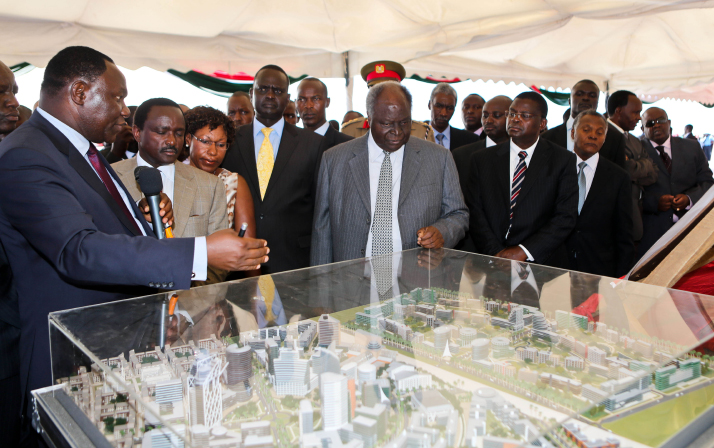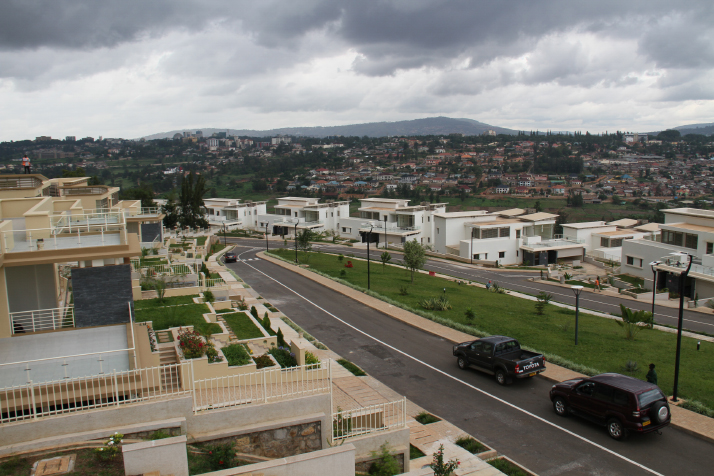|
||||||||||
| Home Nation World Business Opinion Lifestyle ChinAfrica Multimedia Columnists Documents Special Reports |
|
||||||||||
| Home Nation World Business Opinion Lifestyle ChinAfrica Multimedia Columnists Documents Special Reports |
| ChinAfrica |
| Africa Gets Smarter |
| How smart cities can jump-start the continent's development agenda |
| By Benard Ayieko | VOL.11 December ·2019-12-13 |

Former Kenyan President Mwai Kibaki (center) during a visit to the Konza Technopolis project in 2013 (XINHUA)
Smart cities are generally famed for their use of data and technology to create efficiencies, improve sustainability, bring economic development and enhance quality of life for the citizens living and working in the cities.
In addition, smart cities incorporate information and communication technologies (ICT) to boost the quality and performance of services for urban dwellers, particularly in energy, transportation and utilities, with the sole objective of reducing resource consumption, waste and other costs related to the running of ordinary cities.
The concept of building smart cities continues to gather momentum around the globe, with Africa joining other continents to realize this dream. Smart cities were brought into sharp focus in 2008 by the International Business Machines (IBM) Corp., and it is interesting to note that IBM began its work on the smarter cities concept as part of its Smarter Planet Initiative. This idea gathered global momentum in 2009, with countries like China, South Korea and the UAE leading the pack. The Financial Times reported in June this year that nearly 500 of the estimated 1,000 smart cities being constructed worldwide are in China. Currently, cities of Hangzhou, Shanghai, Beijing, Guangzhou and Xi'an are the leading smart cities in China, embracing a range of smart applications that include traffic management, parking, cashless payments, technological innovations, healthcare management and rural-urban migration.
The Wuhan City is the latest addition and it aims to become a leading city in the application of technology to improve the lives of its people. The Chinese experience in building smart cities offers the world, and especially African countries, an opportunity to learn and share knowledge, skills and experience in building smart cities.
Global trend
Like bushfire, the concept of smart cities has spread rapidly to become a menu for most policymakers the world over. Today, countries like India, Austria, the Netherlands, Denmark, Egypt, France, Malta and Italy have joined the global smart city ecosystem that aims at implementing the New Urban Agenda and the 2030 Agenda for Sustainable Development through creation of livable, sustainable cities conducive to inclusive growth and development.
Africa has not been left behind in the global smart city ecosystem. With several African countries recording impressive economic growth, the concept of smart cities is being integrated in the development plans of most countries, especially in Sub-Saharan Africa. Countries such as Kenya, Nigeria, Ghana, Rwanda and South Africa are seen as prime examples, with a large set of successful initiatives inspired by their respective economic blueprints. In Nigeria, Eko Atlantic City in Lagos, built on land reclaimed from the sea, aims to offer smart solutions to citizens while presenting opportunities for investors and residents with state-of-the-art hi-tech infrastructure in line with modern and environmental-friendly solutions. Eko Atlantic City targets to house 250,000 people.
In Kenya, East Africa's largest economy, Konza Technopolis, dubbed "Africa's Silicon Savannah," is the government's flagship project under the economic blueprint Vision 2030, designed to foster the growth of the technology industry and to support integration of urban ICT. The multi-billion-dollar city, located on a 5,000-acre land, 60 km southeast of Nairobi, aims to create about 100,000 jobs for the youth by 2030. Kenya also boasts Tatu City, a private development neighboring the capital being built on 1,035 hectares of land and expected to house 77,000 residents.
Meanwhile, Appolonia City in Ghana is a smart city that will accommodate over 160,000 residents on land developed for living and commercial purposes. In addition, Ghana's Hope City is a $10-billion hi-tech hub for housing 25,000 residents and creating jobs for 50,000 people.
Not to be outdone, the Democratic Republic of the Congo's La Cite du Fleuve demonstrates Africa's commitment to smart city development, while in Rwanda, Vision City has been constructed to transform the country into a "center of urban excellence in Africa" in line with Rwanda's Vision 2020 economic blueprint. It envisages a Singapore-like commercial and shopping area that boasts glass-box highrises and modern hotels, as well as green-themed parks and entertainment facilities. Vision City creates a tech-enabled neighborhood with solar powered street lamps and free WiFi for easier connection to smart services and facilities.
South Africa's foray into smart cities includes Waterfall City, outside Johannesburg, poised to be the new Central Business District of Gauteng Province, embracing urban living with offices, residential, retail, schools, hotels, hospital, parks, restaurants and entertainment.

A section of Vision City in Kigali, Rwanda, in 2017 (XINHUA)
Reshaping urban life
So why smart cities in Africa? The concept of smart cities is meant to reshape urbanization and development goals in Africa. Policymakers on the continent see it as one of the solutions to the rapid urbanization growth and the use of ICT is meant to improve the quality of life, efficiency of urban operations and services to foster competitiveness in the economy of Africa. The incorporation of modern technology in building smart cities is motivated by the belief that Africa would experience sustainable growth and development, create employment opportunities and enhance service delivery to its people. The e-parking solution in Nairobi and the Rwandan "irembo" - online e-government services portal - are key smart cities' urbanization-led innovations, impacting positively on the lives of the people.
A report published by the United Nations Department of Economic and Social Affairs, titled "2018 Revision of World Urbanization Prospects," predicts 2.5 billion more people will live in cities by 2050 and that 90 percent of those people will be from either Africa or Asia. It also notes that three African cities - Cairo (Egypt), Kinshasa (Democratic Republic of the Congo) and Lagos (Nigeria) - have already grown beyond a population of 10 million and are formally megacities. This underscores the need for African countries to put concerted efforts into building more smart cities to deal with the anticipated challenges that come with rapid urbanization.
Overall, the building of smart cities in African countries will enhance more effective data-driven decision making, service delivery and government's increased engagement with its citizenry. The building of smart cities in Africa also creates a transformational aura to reduce congestion and create spaces dedicated to recreational uses, thereby improving people's quality of life. As Rwandan President Kagame said, "to get the cities we want, we must always keep the people we serve at the center of our efforts."
(The writer is a Kenya- based economist and regional commentator on trade and investment)
(Comments to zanjifang@chinafrica.cn)
| About Us | Contact Us | Advertise with Us | Subscribe |
| Copyright Beijing Review All rights reserved 京ICP备08005356号-5 京公网安备110102005860号 |